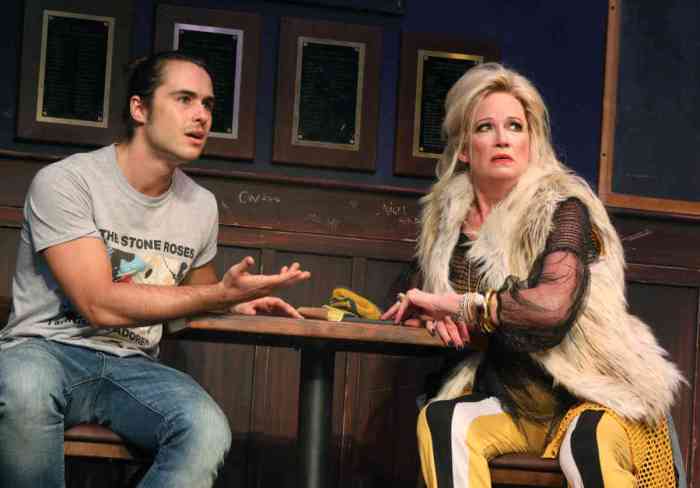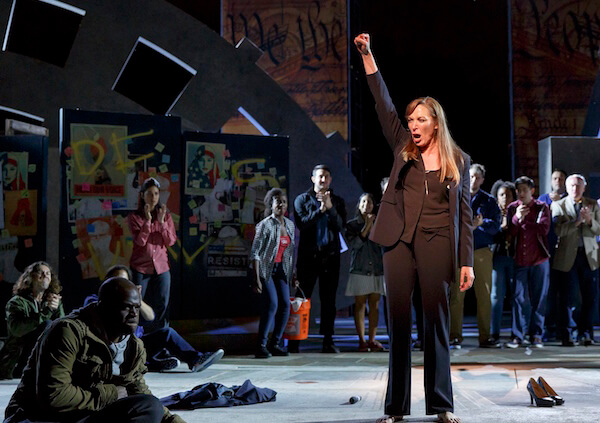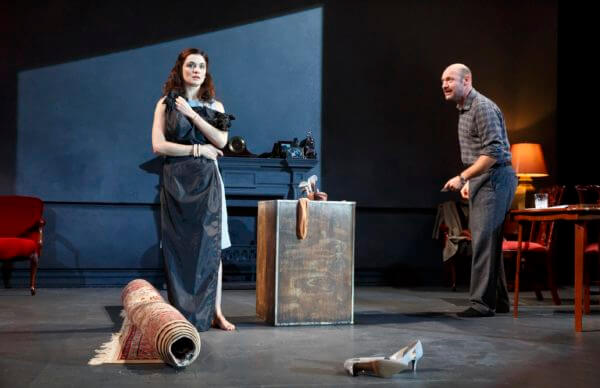Chukwudi Iwuji and Corey Stoll in Ruben Santiago-Hudson’s production of “Othello” at the Delacorte Theater through June 24. | JOAN MARCUS
It’s purely speculative, but it wouldn’t be remotely surprising if the Public Theater’s decision to stage “Othello” on a set of Gothic arches with actors in full Elizabethan drag is intended as a subtle, thumbed-nose response to the reactionary protesters of last season’s modern-dress “Julius Caesar” that provoked such ire as it (visually) likened Caesar to Donald Trump, suggesting our president might have authoritarian tendencies. My, what a year can reveal.
Thus, while Ruben Santiago-Hudson’s splendid production at the Delacorte in Central Park may appear the sine qua non of benign, classical theater — that is, “boring” to knee-jerk reactionaries — it is a searing indictment of the Trumpian culture of lies and the gullible fools who buy into them.
The focus here is not so much the lies that Iago — having been passed over for promotion in favor of Michael Cassio and seeking revenge — tells to poison Othello against his wife, Desdemona, and convince him she is unchaste with Cassio but rather Othello’s willingness to believe a narrative that fits with his darkest suspicions that drives the tragedy. Similarly, Iago easily manipulates Roderigo, thwarted in his suit to Desdemona by her elopement with the Moor Othello, a black man, to believe that Desdemona can see she was wrong and fall for Roderigo, resentful and outraged that the affections that are rightfully his have been usurped.
Iago succeeds in his manipulations because both Othello and Roderigo believe him trustworthy, noble even, and therein lies Iago’s power to manipulate with the flimsiest of proof. In this “Othello,” it is the power of narrative and the passions of belief without reason that drive the tragedy. If that doesn’t have a contemporary resonance, I’m not sure what does.
It’s not just the political overtones that make this production so extraordinary, however. “Othello” is also a tragic love story between the Moor and Desdemona, two people who, as Othello says, “loved not wisely but too well.” Even with the dark undercurrents, there is a romanticism and lightness to this production that adds energy to the early scenes and makes the tragedy when it comes so much more wrenching. There is such clarity in the staging and the storytelling — as well as the speech of the actors — that the audience is swept into the tale and carried away with it.
This is a very different production than Sam Gold’s grittier barracks-based production at New York Theatre Workshop last year, but it is every bit as exciting. (If there were ever an argument for seeing as much Shakespeare as you can as often as you can, seeing these two productions so close together is it.)
The company is outstanding. Corey Stoll (who played Brutus in “Julius Caesar” in the park last year) is the perfect Iago for this production. What’s remarkable about his focused and driven portrayal of the character is how little his Iago has to do to manipulate his marks. The understated evil is harrowing, and Stoll’s easy villainy is magnetically sexy as he weaves his tangled web.
Chukwudi Iwuji plays the title role’s full and complex range with confidence and depth. That he never sees until the end how he has been propelled to murder is chilling. Iwuji is so present in the role that it is impossible not to feel his heart break as everything he believed is shown to be false.
Heather Lind is a very contemporary Desdemona. She combines the typical girlishness of the role with a strong sense of self and an independent spirit that is hemmed in by her culture. The tension between who she is and who she must be as Othello’s wife makes her consistently interesting.
Alison Wright gives a powerful, grounded performance as Emilia, Iago’s wife and Desdemona’s attendant. She, too, as been charmed by Iago, but only she has the backbone to fight back when the evil is revealed. The only way for her to be silenced is for Iago to kill her, but by then she has brought the lies crashing down. Like Paulina in “The Winter’s Tale” another woman standing up to a tyrant, Emilia’s confrontation of Othello and Iago reveals the triumph of truth over illusions.
In smaller but no less important roles, Babak Tafti is a deeply affecting Cassio and Motell Foster is a sympathetic and appealing Roderigo.
Toni-Leslie James designed the beautiful, detailed Elizabethan costumes that make the most of a limited pallet of black, white, and metallic brocade and gorgeous fabrics and leather. The simple but effective set is by Rachel Hauck.
As Iago says near the middle of the play, “Men should be what they seem. Or those that be not, would they might seem none.” Othello, quite naturally, agrees with him, but what makes this play a tragedy is that although Othello demands “ocular proof” of Iago’s story, he willingly blinds himself to what he might see if only he looked closer. From the 17th century to now, the message is clear: beware.
OTHELLO | Delacorte Theater, Central Park | Through Jun. 24 at 8 p.m.| Free; ticket information at publictheater.org



































